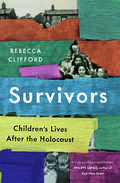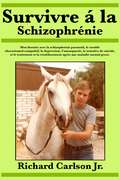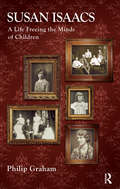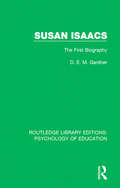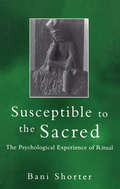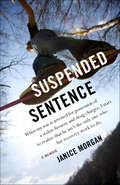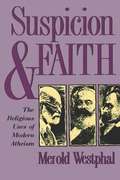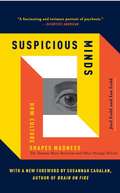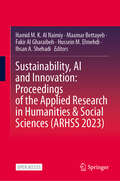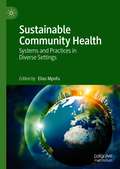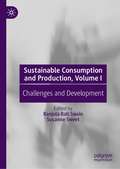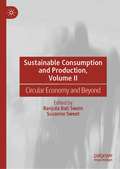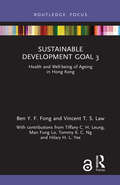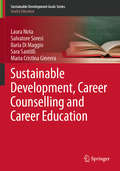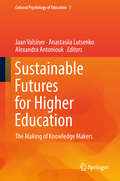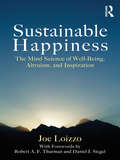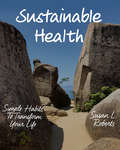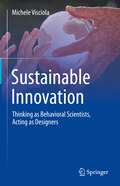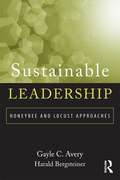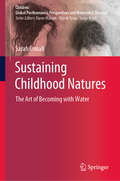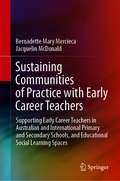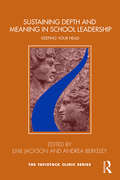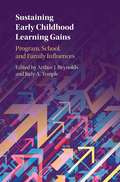- Table View
- List View
Survivors: Children's Lives After the Holocaust
by Rebecca CliffordTold for the first time from their perspective, the story of children who survived the chaos and trauma of the Holocaust How can we make sense of our lives when we do not know where we come from? This was a pressing question for the youngest survivors of the Holocaust, whose prewar memories were vague or nonexistent. In this beautifully written account, Rebecca Clifford follows the lives of one hundred Jewish children out of the ruins of conflict through their adulthood and into old age. Drawing on archives and interviews, Clifford charts the experiences of these child survivors and those who cared for them—as well as those who studied them, such as Anna Freud. Survivors explores the aftermath of the Holocaust in the long term, and reveals how these children—often branded &“the lucky ones&”—had to struggle to be able to call themselves &“survivors&” at all. Challenging our assumptions about trauma, Clifford&’s powerful and surprising narrative helps us understand what it was like living after, and living with, childhoods marked by rupture and loss.
Survivre à la schizophrénie
by Richard Carlson Jr. Berenice Arrieta CortésRichard Carlson Jr. a été diagnostiqué avec la schizophrénie paranoïde quand il avait vingt et un ans. Sa maladie s'est manifestée pour la première fois lorsqu'il était adolescent. La psychiatrie moderne a grandement échoué Richard pendant plus d'une décennie. Puis, après un incident impliquant la police, il a vraiment compris que son diagnostic était réel, et a finalement commencé le long processus de récupération. Plus de dix ans plus tard, sa vie est grandement améliorée. Au cours de son traitement, Richard a également guéri de la dépression, du trouble obsessionnel-compulsif et de la léthargie. Ne laissez pas ce qui est arrivé à Richard vous arriver, à un être cher ou à un patient souffrant de maladie mentale grave. Soyez toujours honnêtes les uns avec les autres et avec votre psychiatre.
Susan Isaacs: A Life Freeing the Minds of Children
by Philip GrahamThis biography provides a critical account of the life and work of Susan Isaacs (1885-1948). This educationist, a pioneer of child-centred education in Britain was also an early and historically important child psychoanalyst. She is described in the Oxford Dictionary of National Biography as the greatest influence on British education in the twentieth century. Yet she is virtually unknown in both educational and psychoanalytic circles. When Melanie Klein was threatened with expulsion from the British Psychoanalytic Society she was by far her most powerful advocate and thus played a major role in determining the direction of British psychoanalysis from the 1940s onwards. This book provides an account of her life and contains much intimate material about her childhood, her marriage and her work that was previously unknown. It gives a fascinating insight into many facets of her life and concludes with an appraisal of her impact on the worlds of education and psychoanalysis.
Susan Isaacs: The First Biography (Routledge Library Editions: Psychology of Education)
by D.E.M. GardnerOriginally published in 1969, this is the first biography of Susan Isaacs, the first attempt to estimate her incalculable contribution to the theory and practice of the education of young children. As a pioneer of new teaching methods, Susan Isaacs will be remembered mainly for her work at the Malting House School in Cambridge in the 1920s, and her contribution was such that in 1933 the Department of Child Development at the University of London, Institute of Education was specially created for her; she was Head of the Department until 1943. But Susan Isaacs was also a psychoanalyst, and D.W. Winnicott in his Foreword refers to the time when he was supplying cases for her child analysis training: ‘I watched with interest her sensitive management of the total family situation, a difficult thing when one is engaged in learning while carrying out a psycho-analytic treatment involving daily sessions over years.’ D.E.M. Gardner, who was a close friend as well as student of Susan Isaacs, begins by describing Susan’s childhood in a Lancashire cotton town, and throughout the book she helps us to feel the force of Susan’s personality and intellect – ‘she was a truly great person, one who has had a tremendous influence for good on the attitude of parents and of teachers to the children in their care’.
Susceptible to the Sacred: The Psychological Experience of Ritual
by Bani ShorterIn Susceptible to the Sacred, Bani Shorter, a well-known Jungian analyst, examines the psychological experience of ritual in contemporary life and how this promotes awareness of the individual's natural potential. Basing her book on live material, she investigates, with great sensitivity, how people perceive the sacred and use ritual in their search for purpose, motivation and transformation.
Suspended Sentence: A Memoir
by Janice MorganWhen Janice Morgan, a divorced college professor living in a small town in Kentucky, learns that her son has been arrested for possession of a stolen firearm and drug charges, she feels like she’s living a nightmare. Dylan’s turbulent period as a college student in Cincinnati before this should have warned her, but it’s only now that she realizes how far he has drifted into substance abuse and addiction. As Dylan passes through the judicial system and eventually receives a diversion to drug court, Morgan breathes a sigh of relief—only to find that she, too, has been sentenced right along with him. In the months to follow, she leads a double life: part of it on campus, the rest embarking upon what she calls “rescue missions” to help Dylan stay in the program. But resilience, dark humor, and extreme parenting can only carry you so far. Eventually, Morgan discovers that she needs to gain a deeper understanding of the bipolar and addiction issues her son is dealing with. Will each of them be able to learn fast enough to face these complexities in their lives? Clearly, Dylan isn’t the only one who has recovery work to do.
Suspicion and Faith: The Religious Uses of Modern Atheism
by Merold WestphalMarx, Nietzche, and Freud are among the most influential of modern atheists. The distinctive feature of their challenge to theistic and specifically Christian belief is expressed by Paul Ricoeur when he calls them the "masters of suspicion." While skepticism directs its critique to the truth or evidential basis of belief, suspicion asks two different, intimately intertwined questions: what are the motives that lead to this belief? and what function does it play, what work does it do for the individuals and communities that adopt it. <P><P>What suspicion suspects is that the survival value of religious beliefs depends on satisfying desires and interests that the believing soul and the believing community are not eager to acknowledge because they violate the values they profess, as when, for example, talk about justice is a mask for deep-seated resentment and the desire for revenge. For this reason, the hermeneutics of suspicion is a theory, or group of theories, of self-deception: ideology critique in Marx, genealogy in Nietzsche, and psychoanalysis in Freud. <P><P>Suspicion and Faith argues that the appropriate religious response ("the religious uses of modern atheism") to these critiques is not to try to refute or deflect them, but rather to acknowledge their force in a process of self-examination--and this for two reasons. First, while these critiques are not, as Marx, Nietzsche, and Freud tend to suppose.
Suspicious Minds
by Joel Gold Ian GoldWhat if you woke up with the alarming suspicion that you were being watched?One day in 2003, a patient unlike any other that Dr. Joel Gold had seen before was admitted to his unit at Bellevue Hospital. This man claimed he was being filmed constantly and that his life was being broadcast around the world like The Truman Show--the 1998 film depicting a man who is unknowingly living out his life as the star of a popular soap opera. Over the next few years, Dr. Gold saw a number of patients suffering from what he and his brother, Dr. Ian Gold, began calling the "Truman Show delusion," launching them on a quest to understand the nature of this particular phenomenon, of delusions more generally, and of madness itself. The current view of delusions is that they are the result of biology gone awry, of neurons in the brain misfiring. In contrast, the Golds argue that delusions are the result of the interaction between the brain and the social world. By exploring the major categories of delusion through fascinating case studies and marshaling the latest research in schizophrenia, the brothers reveal the role of culture and the social world in the development of psychosis--delusions in particular. Suspicious Minds presents a groundbreaking new vision of just how dramatically our surroundings can influence our brains.
Suspicious Minds: How Culture Shapes Madness
by Joel Gold Ian GoldCombining extraordinary true stories with the latest research, Joel and Ian Gold take us on a wild journey through the delusional brain to explore the intersection of neuroscience, biology, and culture.<P> Mr. A. was admitted to Dr. Joel Gold’s inpatient unit at Bellevue Hospital in 2002. He was, he said, being filmed constantly, and his life was being broadcast around the world “like The Truman Show”—the 1998 film depicting a man who is unknowingly living out his life as the star of a popular soap opera. Over the next few years, Gold saw a number of patients suffering from what he and his brother, Dr. Ian Gold, began calling the “Truman Show Delusion,” launching them on a quest to understand the nature of this particular phenomenon, of delusions more generally, and the nature of madness itself.<P> The current view of delusions is that they are the result of biology gone awry, of neurons in the brain misfiring. In contrast, the Golds argue, delusions are in fact the result of the interaction between the brain and the social world. By exploring the major categories of delusion via fascinating case studies and marshaling the latest research in schizophrenia, the brothers reveal the role of culture and the social world in the development of psychosis, notably delusions. The result is a groundbreaking new direction for thinking about the interaction of the brain and the world around us.<P> Sure to appeal to those who admire the work of Oliver Sacks, Steven Pinker, and Antonio Damasio, Suspicious Minds presents a fascinating study about just how dramatically our surroundings can influence our brains.<P>
Sustainability, AI and Innovation: Proceedings of the Applied Research in Humanities & Social Sciences (ARHSS 2023)
by Hamid M. K. Al Naimiy Maamar Bettayeb Hussein M. Elmehdi Ihsan A. Shehadi Fakir Al GharaibehThis open-access book presents the proceedings of the first 1st International Conference on Applied Research in Humanities & Social Sciences (ARHSS) held from Oct 31 to Nov 02, 2023, at the University of Sharjah, United Arab Emirates. It showcases the latest advances in research related to digital, ethical, and advanced crime prevention and enhancing social security. In addition, the topics include sustainability and innovation in economy, society, and governance (ESGs). The topics also tackle current issues, focusing on Artificial Intelligence (AI) and its wide applications in humanities and social sciences. Given its scope, the book is essential for scholars, students, policy-makers, and education practitioners interested in better keeping up with the latest advances in this critical field.
Sustainable Community Health: Systems and Practices in Diverse Settings
by Elias MpofuApplying a trans-disciplinary approach, this book provides a comprehensive, research-based guide to understanding, implementing, and strengthening sustainable community health in diverse international settings. By examining the interdependence of environmental, economic, public health, community wellbeing and development factors, the authors address the systemic factors impacting health disparities, inequality and social justice issues. The book analyzes strategies based on a partnership view of health, in which communities determine their health and wellness working alongside local, state and federal health agencies. Crucially, it demonstrates that communities are themselves health systems and their wellbeing capabilities affect the health of individuals and the collective alike. It identifies health indicators and tools that communities and policy makers can utilize to sustain truly inclusive health systems. This book offers a unique resource for researchers and practitioners working across psychology, mental health, rehabilitation, public health, epidemiology, social policy, healthcare and allied health.
Sustainable Consumption and Production, Volume I: Challenges and Development
by Ranjula Bali Swain Susanne SweetEconomic growth and increasing population impose long-term risks to the environment and society. Approaches to address the impact of consumption and production on bio-diversity loss, resource availability, climate change, and mounting waste problems on land and in seas have yet not proven to be successful. This calls for innovative approaches to address the complex environmental, social, and economic interrelationships that have to be addressed in transforming to sustainable development. Sustainable Consumption and Production, Volume I: Challenges and Development aims to explore critical global challenges and addresses how consumers, producers, the private sector, international organizations, and governments can play an active role in innovating businesses to support a transitioning towards sustainable consumption and production. The book explores different approaches and innovations to address sustainable consumption and production. It details multiple social and economic contexts to the challenges and developments towards a sustainable consumption and production. The book is of interest to economists, students, businesses, and policymakers.Chapter 14 and chapter 15 are available open access under a Creative Commons Attribution 4.0 International License via link.springer.com.
Sustainable Consumption and Production, Volume II: Circular Economy and Beyond
by Ranjula Bali Swain Susanne SweetCircular economy principles are driving to overcome the challenges of today’s linear take-make-dispose production and consumption patterns through keeping the value of products, materials, and resources circulating in the economy as long as possible. Sustainable Consumption and Production, Volume II: Circular Economy and Beyond aims to explore the sustainable consumption and production transition to a circular economy, while addressing critical global challenges by innovating and transforming product and service markets towards sustainable development. This book explores how consumers, private sector, relevant international organizations, and governments can play an active role in innovating businesses to help companies, individuals (consumers and citizens), organizations, and sectors, to remain competitive, while transitioning towards sustainable markets and economies. It is of interest to economists, students, businesses, and policymakers.
Sustainable Development Goal 3: Health and Well-being of Ageing in Hong Kong (Routledge Focus on Public Governance in Asia)
by Ben Y. Fong Vincent T. LawSustainable Development Goals (SDGs) aim to develop a better and sustainable future for the world, and the goals are part of an action plan to address poverty, hunger, health, gender equity and various pressing world issues. One of these goals looks at health and wellness. Ageing populations have become a crucial issue worldwide, and this short monograph explores ageing and how the consequences of an ageing population may affect our healthcare system through a case study on Hong Kong’s population. The book looks at several critical health issues related to ageing. The elderly, particularly those with low socio-economic status, rely more on acute-centric care rather than primary care. The book suggests that secondary care service may only be effective to a limited extent as a healthcare measure and an optimum healthcare system should be one that focuses on primary care. The authors put forth a compelling argument for disease prevention and screening schemes and explain how they are more cost-effective and beneficial to society and the system. This thoughtful book will provide beneficial insights into the relationship of ageing and Sustainable Development Goals in the context of health and wellness for policymakers and healthcare professionals. The Open Access version of this book, available at http://www.taylorfrancis.com, has been made available under a Creative Commons Attribution-Non Commercial-No Derivatives 4.0 license.
Sustainable Development, Career Counselling and Career Education (Sustainable Development Goals Series)
by Laura Nota Salvatore Soresi Ilaria Di Maggio Sara Santilli Maria Cristina GinevraThis book is based on the Life Design paradigm and discusses the efforts made to overcome the matching paradigm between individuals and their work contexts, in order to guarantee the adoption of an active role for future career planning. Starting from the evolution of career counselling and vocational guidance in the 20th century and then following the more updated reflections in the Life Design paradigm, this book discusses research results from the Larios Laboratory (Padova, Italy) in collaboration with numerous international colleagues and institutions. These results show that career counselling and vocational designing can not only help people to plan their future in agentive ways, but also to help them getting out of the ‘mists of the present’ and to project themselves into a future that is yet to be created. This future is aligned by the world of research and international institutions, such as the UN and WHO, and follows the 2030 Agenda for Sustainable Development, with particular attention to Sustainable Development Goals 4, 8 and 12. This book reveals how trajectories can be created from one’s own mission, realized with the help of others and newly acquired strengths. It shows how career counselling and vocational designing can help people to build their own future from an inclusive and sustainable perspective, based on social justice, and to help build a better future for all.
Sustainable Futures for Higher Education: The Making of Knowledge Makers (Cultural Psychology of Education #7)
by Jaan Valsiner Anastasiia Lutsenko Alexandra AntonioukThis volume addresses the current situation in higher education and what creative action needs to be taken for the future development of the various systems of higher education. Higher education in the 21st centuries is under immense pressure from various sides. First, there is dramatic limitation of funding from public sources and limited and selective funding support from private sources that is re-constructing the landscape of higher education in most societies around the World. Secondly there is the continuous stream of administrative re-organization efforts of political origins (e.g. “the Bologna process”) that guide the advancement of higher education in our present time. Increasing privatization of all forms of higher education—from bachelor to doctoral levels—and its corresponding focus on the advancement of the kind of knowledge that has immediate applicability in various spheres of societies leads to the question- what kind of creativity is expected from the new cohorts of students—future makers of knowledge—once the current social re-organization of higher education systems becomes fully established. To address these questions the international, interdisciplinary cast of authors in this volume provides a multitude of possible scenarios for future development of the systems of higher education. This book on “Sustainable Futures of Higher Education” captures the current trends and perspectives of the Knowledge Makers from various nations of the world on meeting and greeting the challenges of globalization and the pressures of the knowledge economy. It makes a strong case for universities of tomorrow sustaining their autonomous thinking and yet nurturing an environment of collaborative partnership with society, corporate and industry to fuel innovations in plenty and continuous supply of new science and technologies. Higher Education has been and shall remain a powerful vehicle of national and global transformation. I see a great value of the publication in impacting the minds of the leaders in higher education around the globe for revitalizing the universities.Professor P. B Sharma, President of Association of Indian Universities, AIU How should the higher education system be in the globalization era? In this book Jaan Valsiner and his colleagues analyze, criticize the existing and propose a new higher education system. When we say "higher education”, three different layers are supposed to be there-- the lower, the middle and the higher. The latter has the function of production of new knowledges. Without new knowledge, our societies are never improving. Authors warn commercialized systems such as the “Bologna system” overestimate the homogeneity of education. ““Universities without Borders” would guarantee both diversity and innovation in the higher education systems.Professor Tatsuya Sato, Dean of Research, Ritsumekan University
Sustainable Happiness: The Mind Science of Well-Being, Altruism, and Inspiration
by Joe LoizzoToday’s greatest health challenges, the so-called diseases of civilization—depression, trauma, obesity, cancer—are now known in large part to reflect our inability to tame stress reflexes gone wild and to empower instead the peaceful, healing and sociable part of our nature that adapts us to civilized life. The same can be said of the economic challenges posed by the stress-reactive cycles of boom and bust, driven by addictive greed and compulsive panic. As current research opens up new horizons of stress-cessation, empathic intelligence, peak performance, and shared happiness, it has also encountered Asian methods of self-healing and interdependence more effective and teachable than any known in the West. Sustainable Happiness is the first book to make Asia’s most rigorous and complete system of contemplative living, hidden for centuries in Tibet, accessible to help us all on our shared journey towards sustainable well-being, altruism, inspiration and happiness.
Sustainable Health: Habits To Transform Your Life
by Susan L. RobertsSimple practices—a marriage of science and spirituality—that will help you take charge of your health. Ancient healers understood the universe as an interconnected conscious relationship between natural elements. As Western medicine took hold, we lost our sense of intuitive healing and practices. Here, occupational therapist Susan L. Roberts—who also has a degree from Harvard Divinity School—gives us tools for self-care based on the five-element theory of traditional Chinese medicine. These elements—fire, earth, wood, metal, and water—can also be linked to contemporary science and the elements of energy, matter, time, and space. Through focus on these elements, readers will learn how to impact tangible experiences of living, such as sleeping, eating, working, and understanding one’s own body. Roberts argues that our bodies communicate with the world, and that symptoms we may experience, such as headaches or exhaustion, can be mitigated by tapping into our ability to take care of ourselves—the essence of sustainable health.
Sustainable Innovation: Thinking as Behavioral Scientists, Acting as Designers
by Michele VisciolaThis book puts forward a new paradigm to understand and implement Sustainable Innovation (SI). Innovation without sustainability leaves out large swathes of the population or generates maladaptive or misappropriate behaviors. Innovative solutions will be sustainable if they can retain individual and group differences while offering greater benefits for the common good. When working together, designers, life, human and social behavioral scientists can add value, which promotes behavioral changes to the advantage of sustainable models in all fields. This volume presents a guide on how to set up sustainable innovation programs, as well as ideas on how to integrate multidisciplinary teams into innovation projects. Moreover, this book offers students a synthesis of non-academic thinking on the relationship between design and behavioral science.
Sustainable Leadership: Honeybee and Locust Approaches
by Gayle C. Avery Harald BergsteinerThe business case for operating along sustainable principles is becoming very clear. Sustainable organizations outperform their peers on many criteria, including corporate social responsibility, employee satisfaction and – surprising for some – even financially. Sustainable Leadership: Honeybee and Locust Approaches presents an evidence-based view of how 23 leadership practices facilitate outcomes that go beyond what is commonly referred to as the triple bottom line – environmental sustainability, corporate social responsibility and financial success. The book centers on a powerful metaphor of honeybee and locust behaviors, which illustrate two leadership philosophies with very different outcomes for a business and its viability. Gathering evidence from scholars combined with observations from successful firms around the world, the book presents a bundle of principles, behaviors and beliefs that forms a sustainable leadership system. This engaging, insightful book offers a set of principles that can be adapted in many ways to underpin sustainable leadership in different situations. It provides evidence and a rationale for building a business case to change towards more sustainable practices.
Sustained Dialogue in Conflicts
by Harold H. SaundersCitizens in our deeply, angrily divided world desperately need peaceful and productive ways of relating to each other. Rooted in four decades of intense experience in deep-seated human conflicts, Saunders presents a peaceful way of transforming destructive relationships and designing change.
Sustaining Childhood Natures: The Art of Becoming with Water (Children: Global Posthumanist Perspectives and Materialist Theories)
by Sarah CrinallThis book examines sustainability learning with children, art and water in the new material, posthuman turn. A query into how we might sustain (our) childhood natures, the spaces between bodies and places are examined ontologically in daily conversations. Regarding philosophy, art, water and her children, the author asks, how can I sustain waterways if I am not sustaining myself?Theoretically disruptive and playful, the book introduces a new philosophy that combines existing philosophies of the new material and posthuman kind. The ecological sciences, and the arts, are drawn together / apart to help recognize sustainability in its emergent, relational form. All the while this book, as art, engages and flows over the reader – as such, reading it becomes a transformative, meditative experience. Daily rhythms of ‘being-with’ art, water and children take the reader beyond orientations of environmental education that focus on notions of lack and reduction. New possibilities for sustaining childhood natures – for what is becoming, and unbecoming – emerge here in the making processes of an academic, everyday life in early motherhood.
Sustaining Communities of Practice with Early Career Teachers: Supporting Early Career Teachers in Australian and International Primary and Secondary Schools, and Educational Social Learning Spaces
by Bernadette Mary Mercieca Jacquelin McDonaldThis book focuses on sustaining communities of practice in primary and secondary schools in Australia and internationally for the professional learning of all teachers, and particularly, early career teachers. Informed by the communities of practice research of Wenger-Trayner, it shows what factors are conductive to the sustainability of communities of practice, drawing particularly on a case study of an Australian regional secondary school, and explores how it has sustained support particularly for early career teachers over a three-year period.The first chapters of the book provide longitudinal perspectives using qualitative data and include perspectives from a variety of stakeholders, including the principal, the professional learning coordinator and the early career teachers who have experienced the school’s Communities of practice over three or more years. It offers practical suggestions on how to implement and improve communities of practice in schools and highlights the increasing importance of online communities to support early career teachers. Policy-makers, school principals, teacher educators and teaching practitioners find the book useful for implementing and sustaining communities of practice in schools.Subsequent chapters explore the value of online communities, such as Twitter communities; the role of collegial support networks in supporting early career teachers in Flemish primary education; and professional learning in Northern Ireland pre- and in-service teacher networked communities.
Sustaining Depth and Meaning in School Leadership: Keeping Your Head (Tavistock Clinic Series)
by Emil JacksonSustaining Depth and Meaning in School Leadership: Keeping Your Head concerns the emotional and psychological experience of school leadership—in particular, the felt experience of life as a headteacher. It describes the pressures and rewards of the role, together with some of the ways that school leaders successfully sustain and develop themselves and their teams in what has become an increasingly complex, challenging, and highly accountable role. This book explores the personal experience of leading schools. Part I provides an overview and analysis of current and historical trends in school leadership and offers some theoretical frameworks for making sense of these. Part II then offers psychodynamic approaches to supporting and developing school leaders and the impact that trends in executive education continue to have on this. Part III looks at approaches to school leadership development more generally, including team development; influences from the business world; the growth of mentoring and coaching as a leadership intervention; the design and evaluation of leadership development programmes; and a case study on whole-system development. The final word is given to ten serving headteachers and deputies and their leadership journeys. This range of chapters, concepts, and perspectives will support school leaders to maintain an emotional equilibrium while navigating the multilayered tightrope of intrapsychic, interpersonal, and organizational dynamics inherent in school life. Rooted in Jackson and Berkeley’s belief that school leaders are likely to be at their best when they find their own unique and authentic way of taking up their leadership role, this book is an accessible, supportive, and developmental contribution for all those involved in education leadership.
Sustaining Early Childhood Learning Gains: Program, School, and Family Influences
by Arthur J. Reynolds Judy A. TempleHow gains from early childhood experiences are initiated, increased, sustained, and affect life-course development are fundamental to science and society. They also have increasing policy relevance, given public investments in early learning programs and the need to measure their effectiveness in promoting well-being. With contributions from leading researchers across many disciplines, this book emphasizes key interventions and practices over the first decade of life and the elements and strategies through which gains can be enhanced by schools, families, communities, and public institutions. Three critical themes are addressed: firstly, the importance of documenting and understanding the impact of investments in early childhood and school-age years. Secondly, increased priority on elements and principles for scaling effective programs and practices to benefit all children. Thirdly, a focus on multiple levels of strategies for sustaining gains and promoting long-term effects, ranging from early care and family engagement to school reform, state, and federal policy.
